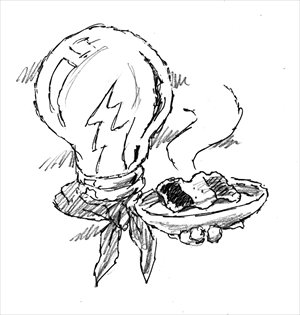Knowledge is power, France is bacon

Illustration: Peter C. Espina/GT
You might be familiar with stories recounted that, although painful during childhood, make adults burst into laughter today. One man's personal story was recounted on Weibo about how, as a boy, he heard his father tell him: "Knowledge is power, France is bacon." The second half of the sentence haunted the boy for a decade. He tried countless times to prove it was nonsense, yet received approving nods whenever he repeated the phrase to the adults.
In the widely-spread post, the man recalls how he finally surrendered to his curiosity and sought an answer.
"I did ask a teacher what 'Knowledge is power, France is bacon' meant and got a full 10-minute explanation of the 'knowledge is power' bit but nothing on 'France is bacon.' When I prompted further explanation by saying 'France is bacon?' in a questioning tone, I just got a 'yes.' At 12, I didn't have the confidence to press it further. I just accepted it as something I'd never understand."
Of course, the confused boy would have to wait until years later to learn the phrase was a quote: "Knowledge is power." - Francis Bacon.
We don't know the true identity of the guy who owns this bitter childhood story, or even it was made up by someone with a sense of humor. But it does resonate with our understanding that kids live in a different world from adults.
In Antoine de Saiot-Exupery's The Little Prince (1943), the young boy draws a picture of a boa constrictor digesting an elephant that adults mistake for a big hat. Adults' lack of creative thinking prevents them from understand the mind of a child.
Research proves children are among the most creative beings on this planet. Unfortunately, adults in the "real world" are killing creativity by expecting children to behave like grownups.
Children with "special" personalities in most cases are considered odd, disobedient or even dangerous, instead of being encouraged to develop their own identity. In the name of protection and love, parents ask their kids to follow the steps in life they have taken. Many parents set goals for their children that actually align with their own unfulfilled dreams.
Compared with the great benefits a successful offspring can bring to a family or enjoy individually, the unseen risks of living an unhappy life are almost nothing. Actually, "happiness" itself is defined by the parents in many cases.
I'm shocked to see toddlers talk or behave like adults, despite their parents winking at me proudly and saying: "You know, kids are much smarter than we were in the old days. They know everything!"
In Neil Postman's masterpiece The Disappearance of Childhood (1982), he claims that childhood is the outcome of human civilization because in the barbarian era there was almost no difference between adults and kids in their recognition of the world. Now that children know everything (except how to be kids), we appear destined to return to the not-so-exquisite old days.